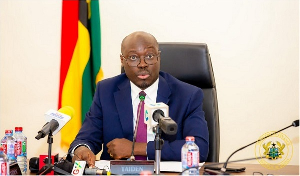Ghana has secured a critical staff-level agreement with the International Monetary Fund (IMF), unlocking the release of a $370 million fifth tranche under the country’s $3 billion bailout programme.
The agreement, reached after two weeks of intensive talks with IMF officials, marks a pivotal step in Ghana’s ongoing efforts to stabilise its economy and accelerate reform.
Minister of Finance Dr Cassiel Ato Forson, announcing the deal in Accra on Tuesday, April 15, described it as a “significant milestone” and reaffirmed the government’s commitment to restoring macroeconomic stability, achieving debt sustainability, and protecting vulnerable populations.
“What rather started as the most difficult review of the programme has ended successfully,” he said during a joint press briefing with IMF officials.
Once approved by the IMF’s Executive Board, the disbursement will bring Ghana’s total receipts under the programme to approximately $2.3 billion.
Dr. Forson acknowledged that his administration inherited a programme that had derailed from several fiscal and structural benchmarks by the end of 2024, with inflation overshooting targets and key reforms stalling. In response, the government has moved swiftly to reorient policy and correct course.
Among the actions taken is an independent audit of a large stockpile of arrears accumulated in 2024, led by the Auditor-General and two international firms.
The report, expected within eight weeks, aims to verify the arrears’ legitimacy and recommend corrective actions.
Legislative reforms have also been introduced. Parliament has amended Ghana’s Public Financial Management Act to include a debt ceiling of 45% of GDP by 2035 and mandate an annual primary surplus of at least 1.5%.
A new independent fiscal council will oversee compliance, while procurement rules now require Finance Ministry certification for all central government contracts.
The IMF welcomed these measures, though noted Ghana’s recent challenges. Mission chief Stéphane Roudet said preliminary data pointed to fiscal slippages ahead of the 2024 general elections, with arrears accumulating and inflation exceeding targets due to delayed policy implementation.
To regain momentum, the 2025 budget projects a primary surplus of 1.5% of GDP, reversing the 3.25% deficit recorded the previous year. The Bank of Ghana has also raised its policy rate to reinforce the fiscal tightening and help curb inflation.
Progress has also been made in reforming the energy sector. The resumption of quarterly electricity tariff adjustments, the operationalisation of a single account mechanism, and further rollout of the Cash Waterfall Mechanism are expected to reduce fiscal risks and prevent new arrears.
Dr Forson vowed to fully implement all programme commitments, saying, “We have made great progress and are determined to stay the course. This is how we build the Ghana we want.”



